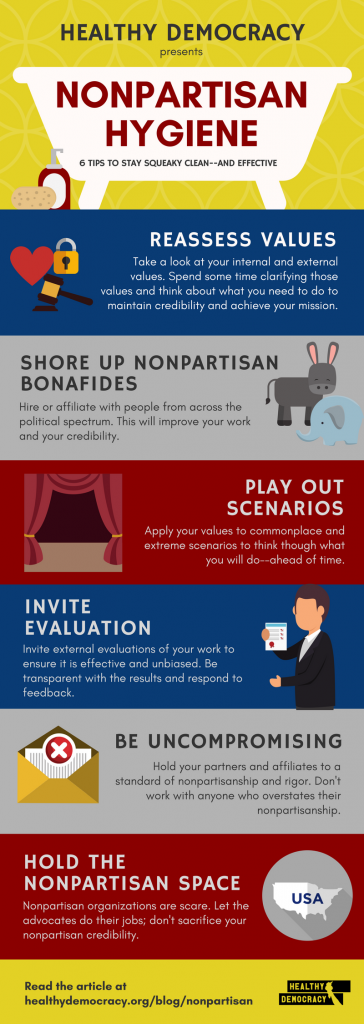We find ourselves in a political moment where significant sectors of the country warn of existential threats to our democracy. This began before the 2016 election, but it has since reached a fever pitch. Signals such as the Economist Intelligence Unit’s recent “downgrade” of the US from a “full democracy” to a “flawed democracy” have added fuel to the fire. At Healthy Democracy, we do not take a position about whether these threats are real or not, though we spend a great deal of time trying to improve our democracy.
Nonpartisan “Positions”
As a nonpartisan organization, we cannot take a position that would turn off members of any political or demographic group. This is because we rely on our reputation as unbiased process experts when working with citizens from across the political spectrum. Additionally, we don’t take positions on issues that might come before a Citizens Initiative Review panel, including the proposals of our peers in the elections reform space.
In some ways, this makes it easy for us to choose the issues on which we take a public position (pretty much nothing), but when “threats to our democracy” come up, and considering our name is Healthy Democracy, what do we do? Do we retweet a statement praising a free press? Or is publicly expressing support for a free press now viewed as a partisan act? We can make these decisions ad hoc, but we risk inconsistency, or worse: letting our personal perspectives and biases sway our decisions. We realized that Healthy Democracy needed to do some thinking. Some nonpartisan hygiene, if you will, to get our internal activities and the external communication of our work squarely in our nonpartisan ethos.
As a result of our analysis, we humbly share some “nonpartisan hygiene” tips that may come in handy to other organizations in this space, including bipartisan political organizations, nonpartisan think tanks, newsrooms, and professional organizations. Government scientists and policy thinkers may find this helpful, as well. This is written with nonpartisan nonprofits in mind, but please take from it anything that is helpful to your organization’s needs.
What we lose when we’re not scrupulously nonpartisan
There is an idea that floats around nonpartisan and social good organizations that we have “nonpartisan capital” that builds up when an organization is nonpartisan for a long time. The theory goes that we can spend this capital in little bits when it’s worth it, for example when a politician does something particularly egregious, or when a policy is implemented that violates our ethics. I speculate that this thinking is dangerous and flawed. Being nonpartisan is an all-or-nothing proposition when it comes to public perception. This is part of why nonpartisan spaces are precious and scarce.
Additionally, that perceived “nonpartisan capital” should not be mistaken for influence or power. Even if we accept the idea of nonpartisan capital, we cannot reliably mete it out, spending only enough to “make a difference” without trashing our reputation. In fact, we risk throwing away our most precious resource if we view it, incorrectly, as something can be given away in metered chunks.
6 Tips to Stay Squeaky Clean and Effective
- Reassess your internal and external values. Most nonprofits have a set of values articulated in their strategic plan. These are typically things like transparency, service, and inclusion. Often, these are internal values about how the organization runs itself, or they are a mix of internal and external values. Take transparency, for instance. This is a laudable internal value, and many nonpartisan nonprofits list it among their core values. But if a politician or public figure does something that violates that value, should the organization publicly condemn it? Probably only if transparency is a core external value, such as the fictional nonpartisan group, Americans for Transparent Government. Do the same exercise with service and inclusion and you can see how this can get tricky if you don’t have a clear sense of your organization’s internal versus external values. Spend some time clarifying internal and external values in a board meeting, retreat, staff meeting, or chat. If you are starting from scratch naming external values, start with your mission and think about what you need to do to keep credibility in your space. Your communications team should be well-apprised of these values, since they are on the front lines of selecting the media with which the organization affiliates and interacts.
- Shore up your nonpartisan bonafides among your staff, board, and partners. The simplest way to get nonpartisan credibility is to have actual political diversity on your staff, even if you don’t publicly identify your political affiliations. Not only will this increase your organization’s credibility, it will make you better at your work. If you have trouble attracting staff from one side of political spectrum, examine that! If you can’t easily hire to bring more political diversity onto your staff, consider affiliating with a thoughtful person who brings a different political orientation and is willing to consult now and again. If you have a question about whether a particular activity or position would be viewed as overtly partisan, get their take on it. This can reveal blind spots and save your bacon. And there is really no reason not to have a board that reflects political–and other–diversity.
- Play out scenarios, both commonplace and extreme. In your retreat, staff meeting, or chat, start with your external values and play out some scenarios that would challenge them. Consider everything from the commonplace (“Should we retweet this?”) to the extreme (“What if we were asked to do our program on a policy that offends our values?”) In our version of this conversation, we asked ourselves whether we would agree to deliver a Citizens’ Initiative Review on a fictional ballot measure. The fictional measure would require members of a particular religious faith to register with the state government. This kind of policy deeply offends our personal values, and would be an “extreme” scenario. We talked through the pitfalls: would our participation lend legitimacy to an unconscionable policy? Would we run the risk of becoming tainted by affiliating ourselves with the public conversation about the measure? We decided, somewhat to our surprise, that we would do it; we would deliver a citizen review of the measure. But only if we were sure it could be done in a fair and unbiased way, as with every measure we review. The legitimacy question is moot; the measure is already on the fictional ballot. Our participation would simply allow the voters of that state to shine a light on the measure, and that’s a good thing. You really have to believe in your programs in a case like this. Thankfully, we do.
- Invite external evaluations of partisanship and effectiveness. Be transparent about the results, and make changes in response to critical feedback. Take advantage of university researchers who will fund themselves to research your work! Think of this like ripping off a band-aid. If you get spotless evaluations the first time, great, but you probably won’t. Be transparent about your efforts to improve non-partisanship and you’ll reap greater effectiveness and rewards. We’re proud that every Citizens’ Initiative Review has been evaluated by independent university researchers, and we owe a great deal our credibility as a deliverer of fair and unbiased processes to those evaluation results. This is worth its weight in gold. If you can’t find a university researcher, at least partner occasionally with an external auditor of your programs to shore up your internal evaluation methods and get a reality check on how well you’re doing.
- Be uncompromising in your affiliations. Hold partners to a high standard of nonpartisanship and rigor. If your work calls for you to affiliate with partisan groups, seek a balance. Don’t work with anyone who doesn’t evaluate their work, or who misrepresents themselves as nonpartisan when they’re not scrupulously so.
- Hold the nonpartisan space. Nonpartisan spaces are scarce and valuable. There are many actors in the advocacy space. Let them do their jobs, and let us do ours.

